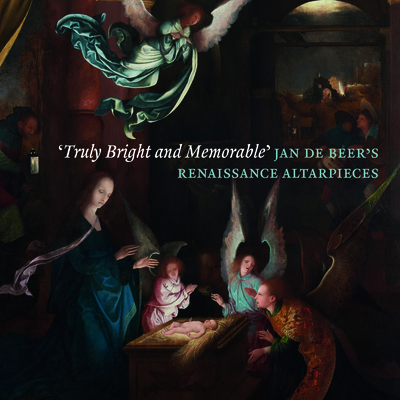- EAN13
- 9781911300724
- Éditeur
- Paul Holberton Publishing
- Date de publication
- 22 novembre 2019
- Nombre de pages
- 84
- Dimensions
- 21 x 21 x 1 cm
- Poids
- 395 g
- Langue
- fre
'Truly Bright And Memorable': Jan De Beer's Renaissance Altarpieces
Robert Wenley, Dan Ewing, Peter Van Den Brink
Paul Holberton Publishing
Prix public : 20,00 €
Accompanying an exhibition at the Barber Institute of Fine Arts - only the second exhibition ever devoted to the artist - this noteworthy publication considers De Beer’s work and career, working methods, and traces the history of De Beer’s paintings in British collections. The Antwerp painter Jan de Beer (c.1475-1527/28) was highly esteemed in his lifetime and still famous a couple of generations after his death, but then fell into oblivion until the early twentieth century. Only recently have his achievements been fully recognized and documented. The artist’s known oeuvre consists of forty works, mainly devotional paintings and triptychs but also a dozen drawings and a stained glass window, after a lost design. De Beer’s stylish and elegant art appealed to patrons and collectors, churches abroad, and copyists. His work is typically associated with that of the Antwerp Mannerists, a prominent group of mostly anonymous painters active in the city during his lifetime. This publication will accompany an exhibition at the Barber Institute of Fine Arts, University of Birmingham (25 October 2019 to 19 January 2020) that focuses on one of its and De Beer’s acknowledged masterpieces: the double-sided Joseph and the Suitors/ The Nativity. This is the only surviving fragment from what must have been a major altarpiece. It will be accompanied by a half-dozen key loans of paintings and drawings by De Beer and his workshop including all the attributed paintings in UK collections. These will provide both an instructive context for the Barber painting and for De Beer’s art more generally, with the whole chronological range of his career represented. It will be only the second ever exhibition devoted to De Beer, and the first to show the broad range of his work. The fully-illustrated catalogue will feature extended entries for all the exhibited works and three essays exploring the core themes of the show, written by Robert Wenley, Head of Collections at the Barber Institute and the lead curator of the exhibition, and two leading De Beer specialists. Professor Dan Ewing (Barry University, Miami Shores, Florida) will consider De Beer’s work and career; while Peter van den Brink (Director, Suermondt-Aachen Museum) will explore De Beer’s working methods, in particular as revealed by the underdrawings of his pictures. Robert Wenley’s essay will survey the history of De Beer’s paintings in British collections.


















